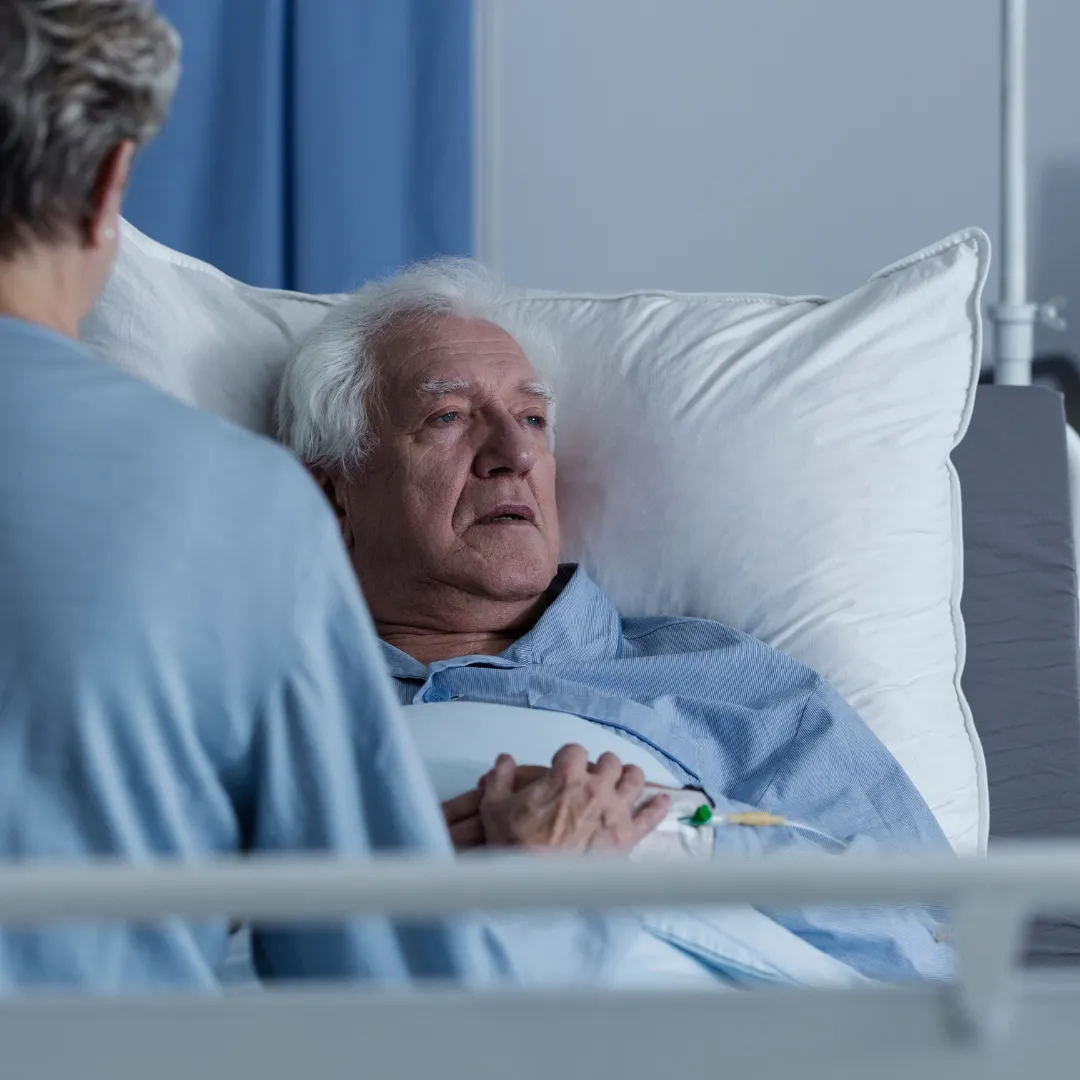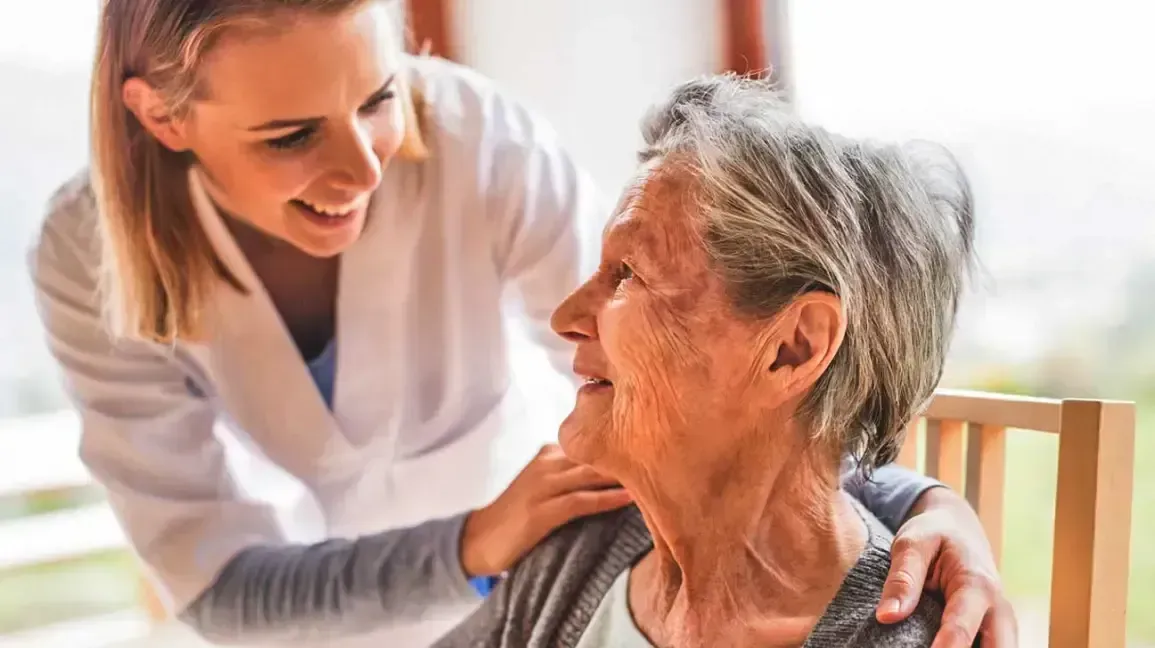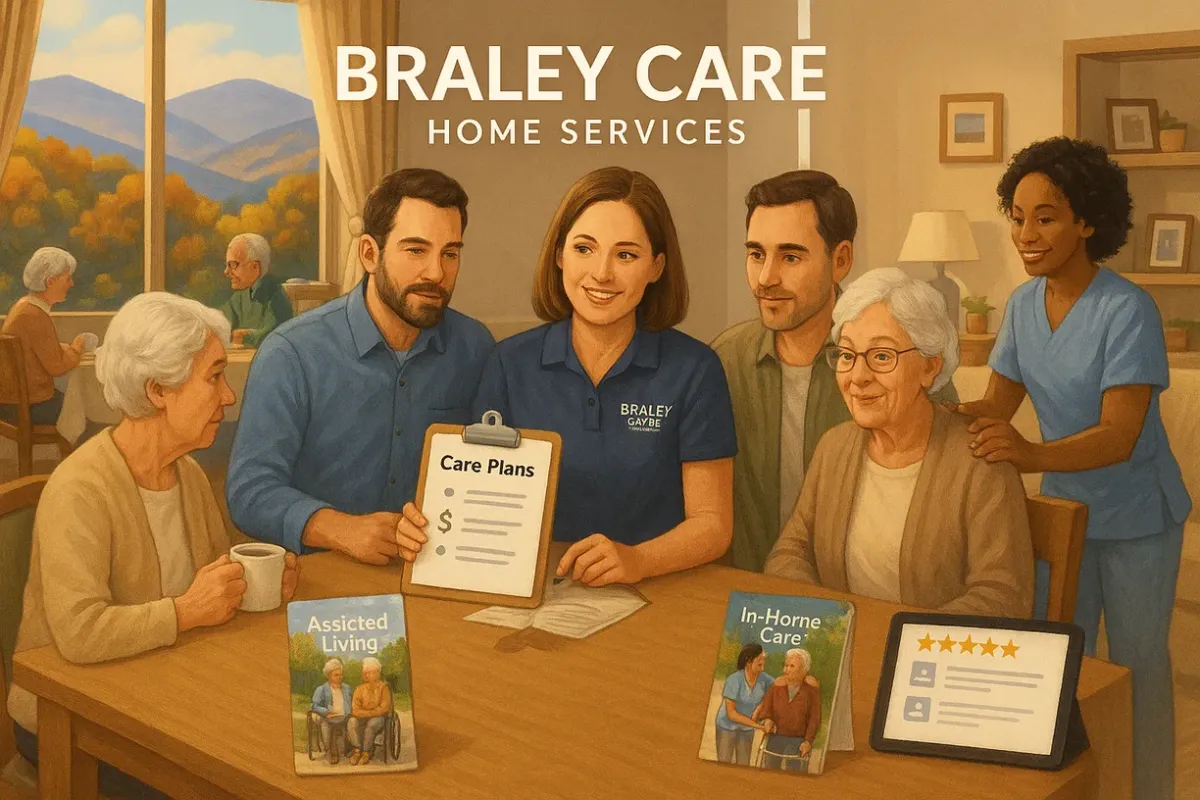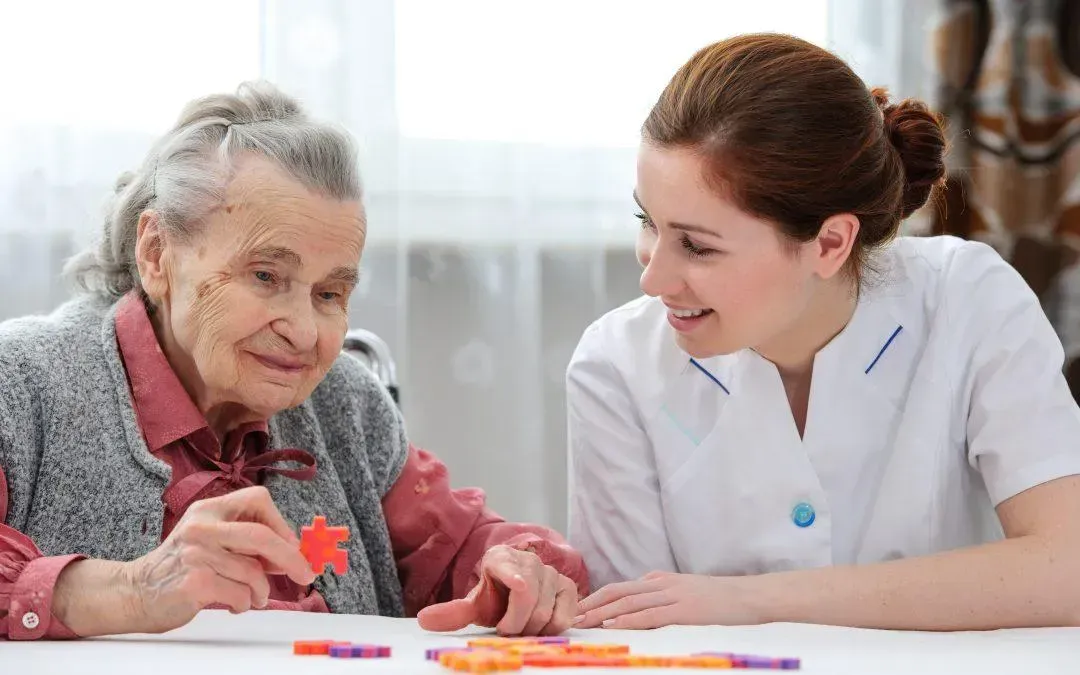Visit us: Mon - Fri: 9:00 - 18:30
Braley Care Homes 6192 US 60 Hurricane, WV 25526
Comprehensive Alzheimer’s Care at Braley Care Homes
Understanding Alzheimer’s Disease
Alzheimer's disease is the most common type of dementia, a progressive condition that affects parts of the brain controlling memory, thought, and language. It begins with mild memory loss and can eventually lead to a loss of the ability to communicate and respond to one's environment. While age and family history are known risk factors, ongoing research is exploring controllable factors that may help reduce the risk. Understanding the nuances of this disease is crucial for effective caregiving. Caring for someone with Alzheimer's requires a comprehensive approach that includes medical support, psychological well-being, and assistance with daily living. Our team at Braley Care Homes is extensively trained to manage the evolving needs of individuals with Alzheimer's, ensuring they receive the best possible care, tailored to their unique journey.
What Triggers Alzheimer’s?
Scientists don’t yet fully understand what causes Alzheimer’s disease in most people. The causes probably include a combination of age-related changes in the brain, along with genetic, environmental, and lifestyle factors. The importance of any one of these factors in increasing or decreasing the risk of Alzheimer’s disease may differ from person to person. Alzheimer’s disease is a progressive brain disease. It is characterized by changes in the brain—including amyloid plaques and neurofibrillary, or tau, tangles—that result in loss of neurons and their connections. These and other changes affect a person’s ability to remember and think and, eventually, to live independently
Alzheimer's Care: Compassionate Support for Your Loved Ones
Alzheimer's disease is an intricate puzzle with many pieces - genetics, lifestyle, and environment only being a few of them. Though some risks like age or family history can't be avoided, today researchers are discovering more controllable factors that could help reduce its risk! Keeping one’s mind sharp has never been so important
(and possible)!

Other risk factors

Family history

Age
Alzheimer's disease, the most common form of dementia, profoundly impacts memory, thought, and behavior. At Braley Care Homes, we understand the complexities of this progressive neurodegenerative disorder and are dedicated to providing compassionate, specialized care that enhances the quality of life for individuals living with Alzheimer's and offers peace of mind to their families. In the United States, millions are affected by Alzheimer's, with significant emotional and financial costs. Our mission is to offer a supportive environment where residents receive personalized care, engaging activities, and the utmost respect and dignity. We focus on creating a safe, nurturing space that addresses the unique needs of each resident, promoting their well-being at every stage of the disease.
What are the stages of Alzheimer's
You can help support your loved one with Alzheimer’s by learning more about how the condition unfolds.
The stages don’t always fall into neat boxes, and the symptoms might vary — but they can be a guide and help you plan for your friend or relative’s care.
Stage 1: No Impairment
During this stage, Alzheimer’s is not detectable and no memory problems or other symptoms of dementia are evident.
Stage 2: Very Mild Decline
The senior may notice minor memory problems or lose things around the house, although not to the point where the memory loss can easily be distinguished from normal age-related memory loss. The person will still do well on memory tests and the disease is unlikely to be detected by loved ones or physicians.
Stage 3: Mild Decline
At this stage, the family members and friends of the senior may begin to notice cognitive problems. Performance on memory tests are affected and physicians will be able to detect impaired cognitive function.
People in stage 3 will have difficulty in many areas including:
• Finding the right word during conversations
• Organizing and planning
• Remembering names of new acquaintances
People with stage three Alzheimer’s may also frequently lose personal possessions, including valuables.
Stage 4 : Moderate Decline
In stage four of Alzheimer’s, clear-cut symptoms of the disease are apparent. People with stage four of Alzheimer’s:
• Have difficulty with simple arithmetic
• Have poor short-term memory (may not recall what they ate for breakfast, for example)
• Inability to manage finance and pay bills
• May forget details about their life histories
Stage 5: Moderately Severe Decline
During the fifth stage of Alzheimer’s, people begin to need help with many day-to-day activities. People in stage five of the disease may experience:
• Difficulty dressing appropriately
• Inability to recall simple details about themselves such as their own phone number
• Significant confusion
On the other hand, people in stage five maintain functionality. They typically can still bathe and toilet independently. They also usually still know their family members and some detail about their personal histories, especially their childhood and youth.
Stage 6: Severe Decline
People with the sixth stage of Alzheimer’s need constant supervision and frequently require professional care. Symptoms include:
• Confusion or unawareness of environment and surroundings
• Inability to recognize faces except for the closest friends and relatives
• Inability to remember most details of personal history
• Loss of bladder and bowel control
• Major personality changes and potential behavior problems
• The need for assistance with activities of daily living such as toileting and bathing
• Wandering
Stages 7: Very Severe Decline
Stage seven is the final stage of Alzheimer’s. Because the disease is a terminal illness, people in stage seven are nearing death. In stage seven of the disease, people lose the ability to communicate or respond to their environment. While they may still be able to utter words and phrases, they have no insight into their condition and need
assistance with all activities of daily living. In the final stages of Alzheimer’s, people may lose their ability to swallow.
Source: alzheimers.net
Braley Care Homes: West Virginia's Premier Alzheimer's Care Specialist
Braley Care Homes stands as a beacon of specialized Alzheimer's and dementia care in West Virginia. As the only standalone facility in the state dedicated exclusively to memory care, we offer a unique and unparalleled level of expertise and focus. Our singular mission is to provide a safe, nurturing, and stimulating environment tailored to the specific needs of individuals living with Alzheimer's disease and other forms of dementia. We pride ourselves on creating a community where residents can thrive, maintain their dignity, and experience a high quality of life, supported by a team deeply committed to compassionate and person-centered care.
While many assisted living centers offer memory care services, these are distinct in their approach. Memory care, as provided at Braley Care Homes, is specifically designed for individuals with dementia, Alzheimer's, and other forms of memory impairment. Our memory care units are intentionally designed for easier navigation and feature 24/7 staff supervision to ensure resident safety, especially for those prone to wandering. This specialized design and constant oversight are critical for individuals with cognitive challenges.

How can I talk to with Alzheimer's
Communicating with a person with memory loss can be difficult, but the right strategies can bridge the gap and foster a more fulfilling relationship between you and your patient or loved one.
Those struggling to communicate with a person
who has memory loss are not alone. As many as four million people in the US may have Alzheimer’s , and, as our population ages, that number is expected to increase. Anyone who is a senior caregiver is likely to be affected and will need to understand how to cope with what is happening.
Memory loss associated with aging, dementia, and Alzheimer’s typically doesn’t happen overnight. Slowly, little-by-little, it sneaks up, until one day, family members realize that they can no longer communicate in the same way with the person they’ve known for years. They suddenly can’t rely on their words and their sentences don’t match the situation.
Because we cannot see the disease—the way we see a broken arm—it’s even more confusing when caregivers see how their patient and/or loved one will have good and bad days. The days when they’re alert and clear-headed make a caregiver hopeful. Then the bad days come, and family members and caregivers feel the pain of losing their patient and/or loved one all over again. This slow and normal progression of the disease makes communication a major challenge for caregivers.
The steps described provide an excellent framework to use on your visits as you approach and converse with someone with Alzheimer’s or other dementia, and are especially relevant during the middle stages of the disease.
• Approach from the front – do not startle them.
• Establish eye contact – this shows interest in them.
• Call the person by name – again, showing interest in them.
• Get down to eye level if needed – this puts you on the same level with them.
• Let them initiate touch – they will come to you when ready.
• Give directions one step at a time – this helps keep it simple, especially for those having difficulty with processing.
What are the stages of Alzheimer's
You can help support your loved one with Alzheimer’s by learning more about how the condition unfolds.
The stages don’t always fall into neat boxes, and the symptoms might vary — but they can be a guide and help you plan for your friend or relative’s care.
Stage 1: No Impairment
You can help support your loved one with Alzheimer’s by learning more about how the condition unfolds.
The stages don’t always fall into neat boxes, and the symptoms might vary — but they can be a guide and help you plan for your friend or relative’s care.
Stage 2: Very Mild Decline
The senior may notice minor memory problems or lose things around the house, although not to the point where the memory loss can easily be distinguished from normal age-related memory loss. The person will still do well on memory tests and the disease is unlikely to be detected by loved ones or physicians.
Stage 3: Mild Decline
At this stage, the family members and friends of the senior may begin to notice cognitive problems. Performance on memory tests are affected and physicians will be able to detect impaired cognitive function.
People in stage 3 will have difficulty in many areas including:
• Finding the right word during conversations
• Organizing and planning
• Remembering names of new acquaintances
People with stage three Alzheimer’s may also frequently lose personal possessions, including valuables.
Stage 4: Moderate Decline
In stage four of Alzheimer’s, clear-cut symptoms of the disease are apparent. People with stage four of Alzheimer’s:
• Have difficulty with simple arithmetic
• Have poor short-term memory (may not recall what they ate for breakfast, for example)
• Inability to manage finance and pay bills
• May forget details about their life histories
Stage 5: Moderately Severe Decline
During the fifth stage of Alzheimer’s, people begin to need help with many day-to-day activities. People in stage five of the disease may experience:
• Difficulty dressing appropriately
• Inability to recall simple details about themselves such as their own phone number
• Significant confusion
On the other hand, people in stage five maintain functionality. They typically can still bathe and toilet independently. They also usually still know their family members and some detail about their personal histories, especially their childhood and youth.
Stage 6: Moderately Severe Decline
People with the sixth stage of Alzheimer’s need constant supervision and frequently require professional care. Symptoms include:
• Confusion or unawareness of environment and surroundings
• Inability to recognize faces except for the closest friends and relatives
• Inability to remember most details of personal history
• Loss of bladder and bowel control
• Major personality changes and potential behavior problems
• The need for assistance with activities of daily living such as toileting and bathing
• Wandering
Stage 7: Very Severe Decline
Stage seven is the final stage of Alzheimer’s. Because the disease is a terminal illness, people in stage seven are nearing death. In stage seven of the disease, people lose the ability to communicate or respond to their environment. While they may still be able to utter words and phrases, they have no insight into their condition and need
assistance with all activities of daily living. In the final stages of Alzheimer’s, people may lose their ability to swallow.
Source: alzheimers.net
How can I talk to someone with Alzheimer's
Communicating with a person with memory loss can be difficult, but the right strategies can bridge the gap and foster a more fulfilling relationship between you and your patient or loved one.
Those struggling to communicate with a person
who has memory loss are not alone. As many as four million people in the US may have Alzheimer’s , and, as our population ages, that number is expected to increase. Anyone who is a senior caregiver is likely to be affected and will need to understand how to cope with what is happening.
Memory loss associated with aging, dementia, and Alzheimer’s typically doesn’t happen overnight. Slowly, little-by-little, it sneaks up, until one day, family members realize that they can no longer communicate in the same way with the person they’ve known for years. They suddenly can’t rely on their words and their sentences don’t match the situation.
Because we cannot see the disease—the way we see a broken arm—it’s even more confusing when caregivers see how their patient and/or loved one will have good and bad days. The days when they’re alert and clear-headed make a caregiver hopeful. Then the bad days come, and family members and caregivers feel the pain of losing their patient and/or loved one all over again. This slow and normal progression of the disease makes communication a major challenge for caregivers.
The steps described provide an excellent framework to use on your visits as you approach and converse with someone with Alzheimer’s or other dementia, and are especially relevant during the middle stages of the disease.
• Approach from the front – do not startle them.
• Establish eye contact – this shows interest in them.
• Call the person by name – again, showing interest in them.
• Get down to eye level if needed – this puts you on the same level with them.
• Let them initiate touch – they will come to you when ready.
• Give directions one step at a time – this helps keep it simple, especially for those having difficulty with processing.
Memory Care vs. Assisted Living: What's the Difference?
Assisted living facilities can be suitable for individuals in the early to intermediate stages of dementia, offering a balance of independence and support. However, for those in later stages requiring constant medical attention and assistance with basic life functions, specialized memory care facilities like Braley Care Homes or nursing homes are often the most appropriate choice.
Understanding Memory Care
At present, a lot of assisted living centers have memory care centers operating within their facilities. However, assisted living and memory care are very different in the services they provide.
Memory care involves a more comprehensive form of elderly care as it is solely dedicated to people living with dementia, Alzheimer’s, and any other forms of memory impairment. Memory care centers are usually easy to navigate through on the chance that a patient manages to wander off but they also have staff members round the clock to provide supervision on the probability that it actually happens.
Dementia patients in the early to intermediate stages usually spend a bit of time in assisted living institutions because they are allowed to be somewhat independent and their health and safety are catered for. The rooms they stay in are private and the staff is not available 24/7 apart from emergency care staff.
Nursing homes accommodate patients with dementia who are at the later stages of their disease when they are not able to walk, talk, or eat by themselves.
Benefits Provided by Memory Care Centers
Of all forms of senior care, memory care has grown increasingly rapid and with good reason too. Memory care services are more specific as compared to assisted living as it is better poised to offer high value to a patient dealing with Alzheimer’s or dementia. Some of these benefits include less violent episodes, increased social interactions, fewer falls or injuries, reduced visits to the emergency room, or decreased need for medications.
On top of the fact that memory care centers are responsible for keeping seniors safe and promoting their physical and mental conditions, they provide patients with care services that are structured to decrease their loss of memory. These services range from basic treatments to patient-curated services designed by industry professionals who have specialized in managing dementia.
When to Consider Specialized Memory Care for Alzheimer's
Choosing whether to transition an elderly loved one to a memory care facility is a significant decision. Here are key factors and benefits that differentiate specialized memory care from other options like nursing homes:
Specialized Activities: Memory care centers often provide activities specifically designed to reduce the development of dementia, such as structured outdoor walks, which may not be as readily available in a typical nursing home setting.
Therapeutic Environment: Memory care units are designed with therapeutic elements in mind, such as brightly decorated walls and ample natural light, which can positively impact individuals living with dementia.
Expert Staff Training: Staff members at memory care units receive specialized training in caring for and responding to dementia-related issues, including wandering, agitation, or aggression. This level of specific expertise is often higher than what you might find in a general nursing home.
Patience and Communication: Memory care staff are skilled in patient communication techniques, approaching individuals gently, and calming them down, especially when administering medicine or managing challenging behaviors.
Enhanced Safety: Memory care facilities are designed for safety, with features that minimize confusion and disorientation, and 24/7 supervision to prevent accidents and wandering.
Every state has rules stipulating staff training and experience for dementia care. Memory care centers typically offer greater assurance in this area, ensuring staffers are better equipped to provide compassionate and effective Alzheimer's care.
Exploring Types of Alzheimer's Care Options
Alzheimer's care can be tailored to the specific stage of the disease and individual needs. Braley Care Homes specializes in providing comprehensive care within our dedicated facility, but understanding the broader landscape of Alzheimer's care options is important:

In-Home Alzheimer's Care
Alzheimer's disease, the most common form of dementia, profoundly impacts memory, thought, and behavior. At Braley Care Homes, we understand the complexities of this progressive neurodegenerative disorder and are dedicated to providing compassionate, specialized care that enhances the quality of life for individuals living with Alzheimer's and offers peace of mind to their families. In the United States, millions are affected by Alzheimer's, with significant emotional and financial costs. Our mission is to offer a supportive environment where residents receive personalized care, engaging activities, and the utmost respect and dignity. We focus on creating a safe, nurturing space that addresses the unique needs of each resident, promoting their well-being at every stage of the disease.

Adult Day Care Centers for Dementia
For patients who need supervision and structured activities during the day, adult day care centers offer a valuable option. These facilities focus on cognitive stimulation, social interaction, and physical exercise, contributing positively to the patient's cognitive functioning.

Assisted Living Facilities with Memory Support
As Alzheimer's progresses, an assisted living facility with specialized Alzheimer's care may be appropriate. They provide a safe environment, regular routines, and professional staff trained in handling the confusion and disorientation common in Alzheimer's patients.

Dedicated Memory Care Units
These are specialized sections within assisted living facilities or nursing homes exclusively designed for individuals with Alzheimer's or other dementias. They offer 24/7 supervision, structured activities, and therapies to maintain cognitive functioning.

Nursing Homes for Advanced Alzheimer's
For those in advanced stages of Alzheimer's, nursing homes offer intensive medical care and support. Staff trained in Alzheimer's care can address complex medical needs and offer end-of-life care.

Respite Care for Alzheimer's
Alzheimer's care can be demanding for caregivers. Respite care allows caregivers to take a break while ensuring that the patient continues to receive proper care. This can be in-home or at a facility for short-term stays.

Integrated Care Approach for Alzheimer's
Alzheimer's care is often most effective when it's a collaborative effort involving healthcare professionals, family members, and various care facilities. Regular routines, physical activity, nutrition, and medication are all tailored to individual needs, creating a comprehensive care strategy.
These types of care form a continuum that aligns with the progression of Alzheimer's disease. Selecting the appropriate type of care requires careful consideration of the patient's current needs, preferences, and available resources. With an estimated average cost of care being $56,800 per year (Alzheimer's Association, 2020), understanding these options is essential for both financial planning and ensuring that the patient receives the most suitable and compassionate Alzheimer's care. The goal is to foster dignity, independence, and the highest possible quality of life at every stage of this challenging journey.
When You Should Consider Choosing Memory Care
There are certain activities that can reduce the development of dementia and these are services you will not usually find in a nursing home. For example, scientific study has shown that doing an outdoors walk at regular times of the day can help people struggling with dementia apart from the straightforward benefits of exercise. You’ll find that a nursing home might not be so open to that idea.
Music, which is usually found in all residential living rooms for the elderly, might not be so welcome to people with dementia. Memory care staff will have to approach and speak to a patient gently before requesting to play them any music despite the fact that it has been found to offer therapeutic benefits to people with Alzheimer’s.
Perhaps the fact that staff members at a memory care unit are better trained in caring and responding to dementia-related issues such as wandering or hostilities from the patient. The chances you’ll find staff trained specifically to help people with dementia working in a nursing home are not as high as staff members working in a memory care unit.
Every state has set in place rules stipulating how staff must be trained and experience for a certain amount of time before they are deemed qualified to engage a patient with dementia. Memory care centers give more assurance on this issue as compared to nursing homes because the staffers are better skilled at patience when communicating with patients with dementia or calming them down so they can receive to be administered medicine on the chance that they become aggressive.
Memory care centers are also designed for people with dementia. Subtle things such as brightly decorated or painted walls or allowance of natural light are therapeutic aspects for people living with dementia.
Choosing whether to make a memory care facility for an elderly loved one is a tough choice. Make sure that you consider the cost, accreditation of the facility, its location, and the services it offers.
Music, which is usually found in all residential living rooms for the elderly, might not be so welcome to people with dementia. Memory care staff will have to approach and speak to a patient gently before requesting to play them any music despite the fact that it has been found to offer therapeutic benefits to people with Alzheimer’s.
Contact Us to
Schedule a Tour!
CONTACT US
Location:
Braley Care Homes
6192 US-60
Hurricane, WV 25526
Phone Numbers:
Referrals and Inquiries: (304) 767-4033
Facility Phone: (304) 201-3677
Facility Fax: (304) 201-3678
AREAS WE SERVE
BUSINESS HOURS
Monday
9:00am – 6:30pm
Tuesday
9:00am – 6:30pm
Wednesday
9:00am – 6:30pm
Thursday
9:00am – 6:30pm
Friday
9:00am – 6:30pm

Our clinic largest private mental health partnership, with a carefully selected nationwide team of Psychiatrists.
KEEP IN TOUCH.
CONTACT US
Location:
Braley Care Homes
6192 US 60
Hurricane, WV 25526
Phone Numbers:
Referrals and Inquiries: (304) 767-4033
Facility Phone: (304) 201-3677
Facility Fax: (304) 201-3678
AREAS WE SERVE
BUSINESS HOURS
Monday
9:00am – 6:30pm
Tuesday
9:00am – 6:30pm
Wednesday
9:00am – 6:30pm
Thursday
9:00am – 6:30pm
Friday
9:00am – 6:30pm



